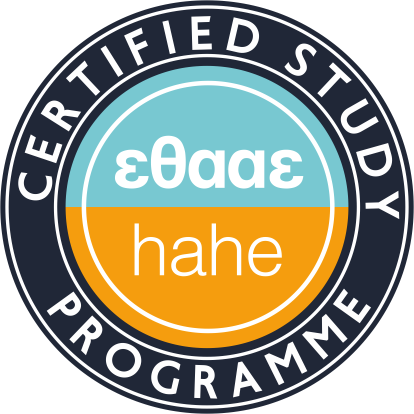MSc in Food Science and Technology
Curriculum – Specializations
The M.Sc. in FOOD SCIENCE AND TECHNOLOGY is structured in two specializations:
Α. Food Safety and Quality Management Systems
Β. Food Processing, Preservation and Biotechnological Processes – Bio-economy Products Development
The M.Sc. degree is awarded to students that complete the required coursework and a compulsory internship, and submit an acceptable thesis. Students must attend a number of courses, as indicated in the next sections, and a series of seminars, given by experts from the field of the food industry or other public Universities, research centers, and institutions / public authorities. Moreover, students are required to do a two-month compulsory internship in either food industry, food consulting companies, food certification agencies, or the departmental food laboratories. The total ECTS credits required for the completion of the M.Sc. degree is ninety (90).
The teaching language of the M.Sc. Program in Greek, whereas the language of the M.Sc. thesis can be either Greek or any other EU Language.
According to the M.Sc. Curriculum, attending courses is mandatory, distance learning is not provided, and every course (module) is equivalent to thirty nine (39) teaching hours.
The analytic Curriculum is structured as follows:
A) Specialization in Food Safety and Quality Management Systems
The first academic semester requires attendance of five (5) courses, chosen and assigned to the students by the steering committee depending on the student’s background, and a series of seminars. The total ECTS credits for the first semester is thirty (30).
The second academic semester requires attendance of five (5) compulsory courses and a series seminars. The total ECTS credits for the second semester is thirty (30).
|
1st Semester |
2nd Semester |
||
|
MODULES |
ECTS |
MODULES |
ECTS |
|
Experimental Design and Data Analysis |
4 |
Food Quality and Safety Management Systems Standards |
6 |
|
Food Microbiology and Applied Microbiology |
6 |
Modern Methods of Microbiological Analysis |
6 |
|
Food Chemistry |
6 |
Risk Analysis – Quantitative Food Microbiology |
6 |
|
Food Biochemistry |
6 |
Standards for Good Agricultural Practices (G.A.P.) Management |
5 |
|
Food Engineering |
6 |
Management Systems Audit |
5 |
|
Food Biopolymers |
6 |
Seminars |
2 |
|
Legislation and Food Safety Management Systems (HACCP) |
6 |
||
|
Foodborne Diseases and Poisonings |
6 |
||
|
Statistical Process Control (SPC) |
6 |
||
|
Prerequisite Programs and Good Hygiene Practices |
6 |
||
|
Organization and Management of Food Businesses |
6 |
||
|
Food Businesses Economics |
6 |
||
|
Dairy Science |
6 |
||
|
Seminars |
2 |
||
|
TOTAL ECTS |
30 |
TOTAL ECTS |
30 |
B) Specialization in Food Processing, Preservation and Biotechnological Processes – Bio-economy Products Development
The first academic semester requires attendance of five (5) courses, chosen and assigned to the students by the steering Committee depending on the student’s background, and a series of seminars. The total ECTS credits for the first semester is thirty (30).
The second academic semester requires attendance of one (1) compulsory course and three (3) specialization courses, chosen and assigned to the students by the steering committee depending on their scientific background and area of emphasis, and a series of seminars. The total ECTS credits for the second semester is thirty (30).
|
1st Semester |
|
2nd Semester |
|
|
MODULES |
ECTS |
MODULES |
ECTS |
|
Experimental Design and Data Analysis |
4 |
Design of Food Production Lines, Bioprocesses and Biorefineries (COMPULSORY) |
7 |
|
Food Microbiology and Applied Microbiology |
6 |
Advanced Food Preservation and Processing |
7 |
|
Food Chemistry |
6 |
Advanced Food Engineering - Computational Fluid Dynamics |
7 |
|
Food Biochemistry |
6 |
New Product Development |
7 |
|
Food Engineering |
6 |
Computational Bioprocess Optimization |
7 |
|
Food Biopolymers |
6 |
Bioprocessing and Biorefinery Engineering |
7 |
|
Legislation and Food Safety Management Systems (HACCP) |
6 |
Industrial Biotechnology |
7 |
|
Food Packaging |
6 |
|
|
|
Food Industry Waste Management |
6 |
||
|
Enzymatic and Microbial Processes in Food |
6 |
||
|
Organization and Management of Food Businesses |
6 |
||
|
Food Businesses Economics |
6 |
||
|
Seminars |
2 |
Seminars |
2 |
|
TOTAL ECTS |
30 |
TOTAL ECTS |
30 |
3rd Semester – Common for both Specializations
The third academic semester includes the internship (4 ECTS), seminars (2 ECTS) and the submission of the M.Sc. Thesis (24 ECTS), for a total of thirty (30) ECTS credits.
|
3rd Semester |
ECTS |
|
MSc Thesis |
24 |
|
Internship |
4 |
|
Seminars |
2 |
|
TOTAL ECTS |
30 |

